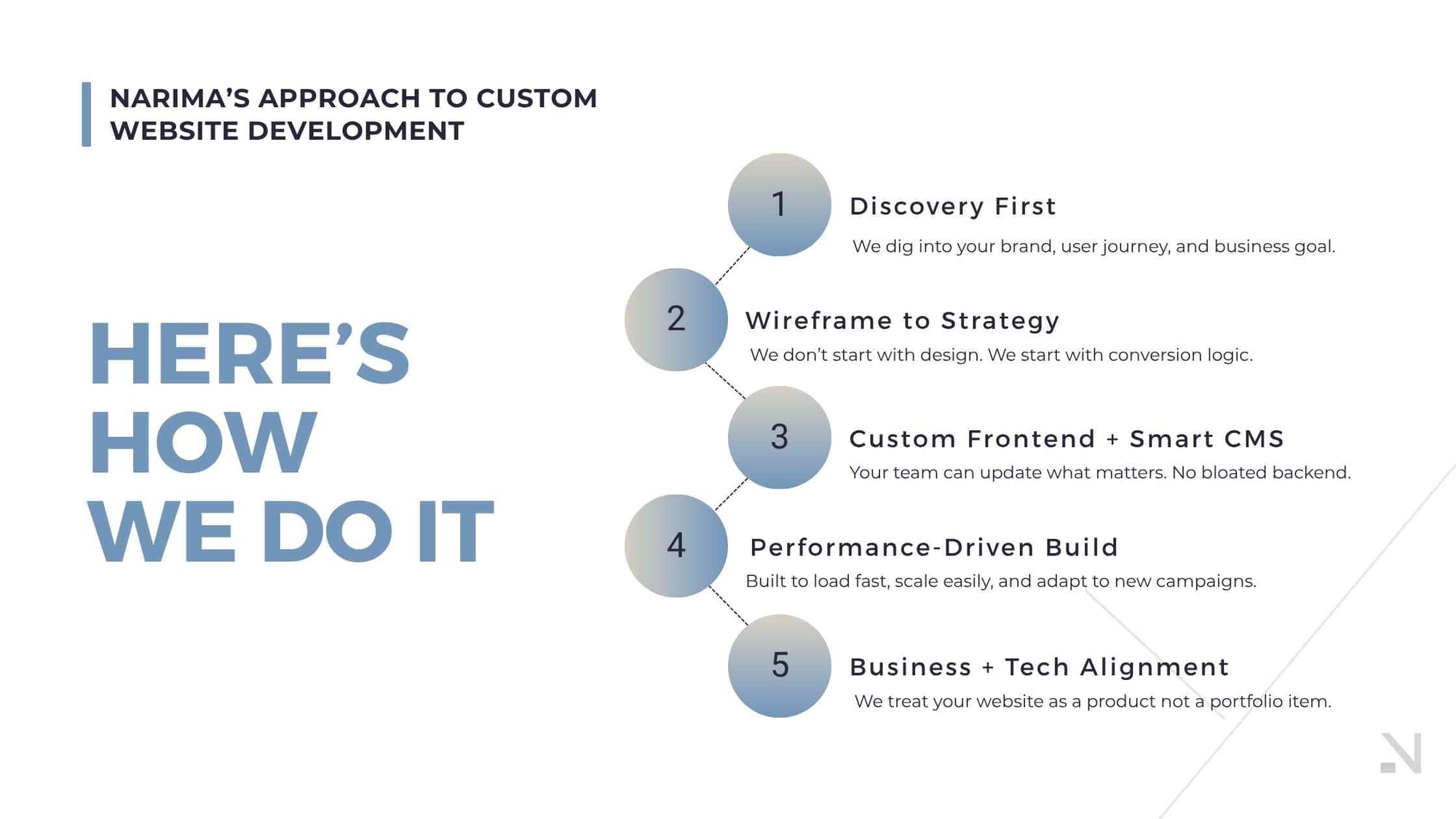Custom Website vs Template: When to Go Bespoke (and Why)
Narima Digital •

“Should We Just Use a Template?” A Question That Deserves a Better Answer
If you’re leading marketing, brand, or product in a growing Australian business, there’s a good chance you’ve asked this:
“Do we really need a custom-built website? Can’t we just use a template?”
The short answer?
It depends on what your website is supposed to do.
Not just how it looks but how it fits into your business strategy.
This article isn’t about bashing templates or hyping custom builds.
It’s about helping you make a smart, strategic choice based on where your business is going, not just what’s easiest today.
The Basics: What’s the Real Difference?
|
Feature |
Template-Based Website |
Custom Website |
|---|---|---|
|
Setup time |
Fast (hours/days) |
Longer (weeks/months) |
|
Cost |
Lower upfront |
Higher initial investment |
|
Flexibility |
Limited (drag & drop) |
Unlimited (built to spec) |
|
Scalability |
Often restricted |
Designed to grow |
|
Unique experience |
Shared by thousands |
Tailored to your brand |
Templates are great for businesses that are just starting. But for mid-sized companies with specific goals, custom websites often become a growth lever, not a cost item.
Ask This First: What’s the Job of Your Website?
Not all websites are created equal. Some are digital brochures. Others are full conversion machines.
Ask yourself:
- Do you want to generate inbound leads?
- Do you need integrations (CRM, CMS, payment, APIs)?
- Are you trying to position your brand as a premium, trusted provider?
- Will your team manage content or campaigns frequently?
- Are you scaling into new markets or languages soon?
If you answered “yes” to more than two you should seriously consider going custom.
3 Business Cases Where Custom Wins (Clearly)
1. You’re a Service Business Competing on Trust
In B2B services, especially tech and consulting, your website is often the first and only proof of your credibility. A generic template won’t cut it.
First impressions count and in 2025, buyers make up their minds fast.
2. You Need Flexibility for Growth
Let’s say your marketing team wants to:
- Launch a resource hub
- Build localized landing pages
- Add a lead scoring system
- Connect to HubSpot or Pipedrive
Good luck doing that on a theme-based website. Custom websites are built with growth in mind, not just launch.
3. You Want Performance + SEO Control
Template sites often come bloated with code, slow loading speeds, and poor mobile performance. That hurts SEO, bounce rate, and conversion. Custom websites let you:
- Optimize performance
- Structure content for Google’s AI Overviews
- Control schema, metadata, crawl behavior, and core web vitals
Small differences in structure = big differences in visibility.
When Templates Are the Right Choice?
We’re not anti-template. In fact, here’s when we’d recommend it:
- You’re testing a new business idea or offer
- You need an online presence fast, with minimal content
- Your site is primarily informational (not conversion-focused)
- Budget is extremely limited and time-to-launch matters more than long-term impact
Just remember: templates are good for starting. They’re rarely good for scaling.
“Can’t I Just Customize a Template?”
Yes — to a point.
But heavily customizing a template often leads to:
- Slower site performance
- Conflicts with future plugin updates
- Expensive patchwork solutions
- Developer headaches (and extra cost)
By the time you “fix” everything, you may as well have built it right from the start.
Narima’s Approach to Custom Website Development
We don’t just build beautiful websites. We build sites that fit your business model and help you grow.
Here’s how we do it:
- Discovery First We dig into your brand, user journey, and business goal.
- Wireframe to Strategy We don’t start with design. We start with conversion logic.
- Custom Frontend + Smart CMS Your team can update what matters. No bloated backend.
- Performance-Driven Build Built to load fast, scale easily, and adapt to new campaigns.
- Business + Tech Alignment We treat your website as a product not a portfolio item.

You don’t need a fancy website. You need a website that works for your team, your market, and your business plan.
If your website is just a digital brochure, go with a template.
If it’s a growth engine, go custom.
Narima helps mid-sized teams in Australia design and build websites that go beyond pretty and become powerful growth assets.

